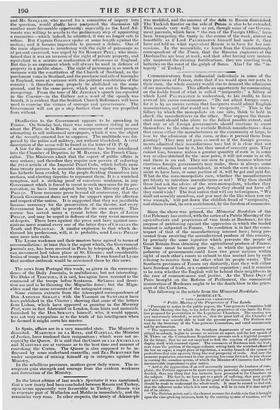Communications from influential individuals in some of the corn provinces
of France, state that if we would open our ports to their corn, the whole country would rise to demand the admission of our manufactures. This affords an opportunity for commenting on the feeble fraud of what is called " reciprocity ;" a fallacy of which Lord PALMERSTON is understood, to his credit, to have avowed his entire consciousness. "Do not admit foreign corn ; for it is by no means certain that foreigners would admitEnglish manufactures, and that would not be reciprocity.'" This is the fallacy by which the monopolists on one side, think to hold in cheek the manufacturers on the other. Now suppose the threat- ened result should take place to the fullest possible extent, and that any or all foreign governments should continue to exert themselves to the utmost to exclude British manufactures : does that cause either the manufacturers or the community at large, to lose by the admission of the corn, or does it prevent them from gaining? They may not gain so much as if the foreign govern- ments admitted their manufactures too; but it is clear that not only they cannot lose by it, but they must of necessity gain. They cannot lose, because unless a greater quantity of corn is in some way or other obtained for the :arne price, it will not come in at all, and there is an end. They are sure to gain, because whatever exertions- foreign governments may make, there is always some way or other, direct or roundabout, in which the corn it is conve- nient to have here, or some portion of it, will be got and paid for. What do the corn-monopolists care, whether the manufacturers get liberty to introduce manufactures or not? 'Why then should these last ask the advice of the corn-monopolists, whether they should have what they can get, though they should not have all they could wish ? The first nation that will say to foreigners, " We shall act sensibly ourselves, and you may do the like when you are wise enough," will put down the childish fraud of "reciprocity," and obtain its end, its own enrichment, by the freedom of commerce.
















 Previous page
Previous page